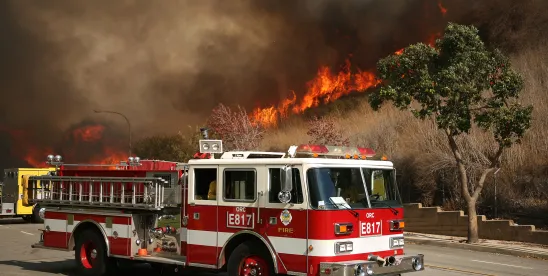On January 7, 2025, Governor Newsom proclaimed a State of Emergency in Los Angeles and Ventura Counties due to the fire in the Pacific Palisades and windstorm. This proclamation triggered price the application of California Penal Code Section 396, which generally prohibits price increases for specified goods and services for specified periods following an emergency proclamation. The statute sets forth prohibitions of varying time periods depending upon the goods, service or activity. This post focuses on just one of these prohibitions.
Section 396(b) declares it unlawful for any person, business, or other entity, to:
Upon the proclamation of a state of emergency declared by the President of the United States or the Governor, or upon the declaration of a local emergency by an official, board, or other governing body vested with authority to make that declaration in any county, city, or city and county, and for a period of 30 days following that proclamation or declaration, sell or offer to sell any consumer food items or goods, goods or services used for emergency cleanup, emergency supplies, medical supplies, home heating oil, building materials, housing, transportation, freight, and storage services, or gasoline or other motor fuels for a price of more than 10 percent greater than the price charged by that person for those goods or services immediately prior to the proclamation or declaration of emergency, or prior to a date set in the proclamation or declaration. . . . If the person, contractor, business, or other entity did not charge a price for the goods or services immediately prior to the proclamation or declaration of emergency, it may not charge a price that is more than 50 percent greater than the cost thereof to the vendor as “cost” is defined in Section 17026 of the Business and Professions Code.
On January 12, 2025, Governor Newsom issued an executive order extending this period until January 7, 2026.
The breadth of this prohibition is notable in at least two respects. First, it is not limited to persons who sell goods ("goods" are defined in Civil Code Section 1689(c)). On its face, therefore, it applies to all levels of the supply chain - manufacturer, distributor, and retail. Second, the statute includes no geographic limitations on the locations of the seller, buyer, or the transaction. The statute, for example, does not state that it is unlawful for a business in this statenor does the statute state that it is unlawful to sell or offer to sell in this state (c.f., Cal. Corp. Code § 25008 (defining when an offer or sale is made "in this state"). The legislature, however, did express an intention to cover online sales.
These omissions will undoubtedly lead to questions about the statute's application. Suppose, for example, a supplier in Illinois raises its prices nationwide by 15%. Is it in violation of the statute? Does the answer change if one of the supplier's buyers is located in California? What if a buyer is a retail chain with stores in multiple states? Can that retailer raise its prices at its stores outside of California by more than 10%? Online sales raise similar geographic questions.
These and other questions are all the more problematical because the legislature has specified that the statute is to be "liberally construed". Consequently, they may lead to constitutional and jurisdictional challenges to the statute.
The statute does provide an exception for increased costs:
However, a greater price increase is not unlawful if that person can prove that the increase in price was directly attributable to additional costs imposed on it by the supplier of the goods, or directly attributable to additional costs for labor or materials used to provide the services, during the state of emergency or local emergency, and the price is no more than 10 percent greater than the total of the cost to the seller plus the markup customarily applied by that seller for that good or service in the usual course of business immediately prior to the onset of the state of emergency or local emergency.
However, the statute makes no allowance for price increases agreed upon before the state of emergency. Clearly, the legislature knew how to include such an exception because it did so in Section 396(e) with respect to rental agreements.
Government price controls are not new. In the fourth century C.E., the Emperor Aurelius Valerius Diocletianus (aka Diocletian) attempted to tame inflation by instituting price controls in the Edictum De Pretiis Venalium (Edict Concerning the Prices of Things Sold).
[S]ed quia una est cupido furoris indomiti nullum communis necessitudinis habere dilectum . . ." (But untamed avarice has one desire - to have no care for the common need).
Diocletian's edict was not effective and resulted, as price controls always do, in widespread shortages. Sellers hoarded their goods until restrictions were removed. R. Kent, The Edict of Diocletian Fixing Maximum Prices, 69 U. Penn. L. Rev. 35, 40 (1920). Just four years later, Diocletian abdicated.



 />i
/>i
